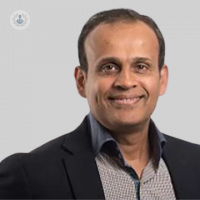Preparation for a cholecystectomy
Written by:A cholecystectomy (surgery to remove the gallbladder) is quite a common procedure and has only a small risk of complications, but it’s important to prepare properly to ensure it goes smoothly.
We recently spoke with Mr Joseph Varghese, renowned consultant general surgeon, about the cholecystectomy procedure to find out what steps should be taken to ensure patients are satisfied.

How should a patient prepare for a cholecystectomy?
Tests
Prior to a cholecystectomy, your surgeon may ask you to undergo a pre-operative assessment to check your pulse, blood pressure, and arrange for you to have blood tests and an ECG (age dependant).
Food and drink
The usual practice is for patients to eat nothing the night before surgery. You may drink a sip of water with your medications, but avoid eating six hours before surgery, particularly milk, chewing gum and sweets. Then, avoid drinking water at least two hours before surgery.
Medication
During the pre-op assessment, you might be asked to stop taking certain medications and supplements. It is likely that you will be asked to continue taking most medications as prescribed. Your doctor may ask you to stop taking certain medications and supplements because they may increase your risk of bleeding.
Personal items
Most patients go home the same day of their cholecystectomy, but complications or difficulties can occur that require one night's stay in the hospital or several nights. If you are likely to stay in the hospital, bring personal items, such as your toothbrush, comfortable clothing, and books or magazines to pass the time.
A friend or family member
Find someone to drive you home and stay with you. Ask a friend or family member to drive you home and stay close the first night after surgery.
What ways can a cholecystectomy be performed?
A cholecystectomy is performed under general anaesthesia. In the majority of the surgeries, the surgeon will recommend one of two surgical approaches:
- Minimally invasive (laparoscopic) cholecystectomy
- Open cholecystectomy
Is recovery from cholecystectomy painful?
Laparoscopic surgical wounds are smaller, less painful and leave a smaller scar when healed, compared to wounds from open surgery. Usually, there are no stitches to remove but there should be steri strips (paper stitches) on the skin.
Expect some amount of discomfort on the right side of the abdomen and the wounds. These can be controlled with simple analgesia (pain relief) that are prescribed when discharged from the hospital. Patients should receive regular analgesia for the first seventy-two hours post-op. Patients can have pain over the right shoulder following cholecystectomy, and this generally lasts for about 48 hours.
How much time do I need off work?
Patients should take time off from work for around 2 weeks. However, this also depends on their type of work.
When can I drive after a cholecystectomy?
It's best to abstain from driving for the first 10 days after cholecystectomy.
What is the success rate of cholecystectomy?
The majority of cholecystectomies are successful in alleviating symptoms. Laparoscopic surgery is successful in 95 per cent of cases. In about 5 per cent of cases, conversion to open surgery is required. This is more common in males, people with recurrent attacks of cholecystitis, previous abdominal operations and injury to other neighbouring structures and bile duct.
A small percentage of patients can have ongoing pain (8 to 10 per cent) and diarrhoea following the cholecystectomy.
If you require a cholecystectomy procedure and you would like to consult your options with an expert, don't hesitate to book an appointment with Mr Joseph Varghese via his Top Doctors profile today.


